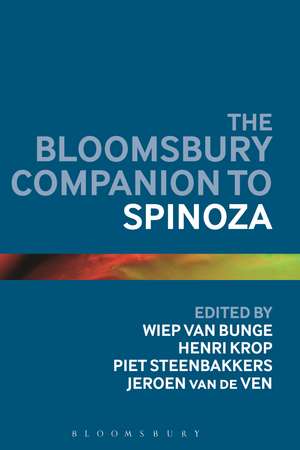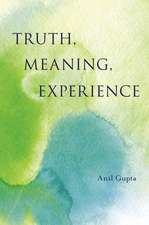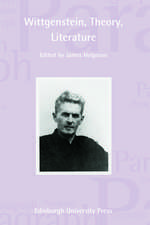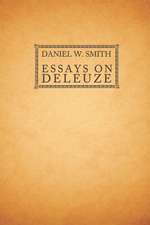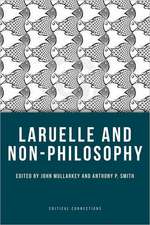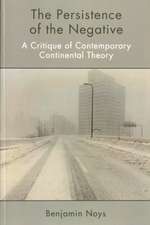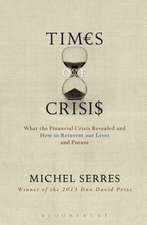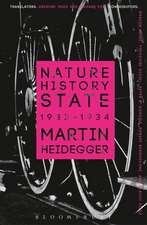The Bloomsbury Companion to Spinoza: Bloomsbury Companions
Editat de Professor Wiep van Bunge, Dr Henri Krop, Piet Steenbakkers, Dr Jeroen M.M. van de Venen Limba Engleză Paperback – 30 iul 2014
Din seria Bloomsbury Companions
- 43%
 Preț: 943.24 lei
Preț: 943.24 lei - 16%
 Preț: 258.54 lei
Preț: 258.54 lei - 21%
 Preț: 256.42 lei
Preț: 256.42 lei - 48%
 Preț: 626.47 lei
Preț: 626.47 lei -
 Preț: 822.27 lei
Preț: 822.27 lei - 17%
 Preț: 256.89 lei
Preț: 256.89 lei - 17%
 Preț: 257.81 lei
Preț: 257.81 lei - 44%
 Preț: 941.35 lei
Preț: 941.35 lei - 41%
 Preț: 226.40 lei
Preț: 226.40 lei -
 Preț: 771.53 lei
Preț: 771.53 lei - 12%
 Preț: 266.68 lei
Preț: 266.68 lei - 44%
 Preț: 940.38 lei
Preț: 940.38 lei - 17%
 Preț: 253.85 lei
Preț: 253.85 lei - 44%
 Preț: 937.45 lei
Preț: 937.45 lei - 45%
 Preț: 141.20 lei
Preț: 141.20 lei - 17%
 Preț: 254.58 lei
Preț: 254.58 lei - 27%
 Preț: 383.62 lei
Preț: 383.62 lei - 44%
 Preț: 938.96 lei
Preț: 938.96 lei - 7%
 Preț: 304.89 lei
Preț: 304.89 lei - 17%
 Preț: 239.59 lei
Preț: 239.59 lei - 12%
 Preț: 257.36 lei
Preț: 257.36 lei - 12%
 Preț: 255.97 lei
Preț: 255.97 lei - 17%
 Preț: 253.67 lei
Preț: 253.67 lei - 12%
 Preț: 264.39 lei
Preț: 264.39 lei - 16%
 Preț: 258.28 lei
Preț: 258.28 lei - 44%
 Preț: 937.06 lei
Preț: 937.06 lei - 41%
 Preț: 225.08 lei
Preț: 225.08 lei - 12%
 Preț: 254.58 lei
Preț: 254.58 lei - 22%
 Preț: 252.76 lei
Preț: 252.76 lei - 17%
 Preț: 255.51 lei
Preț: 255.51 lei - 41%
 Preț: 193.99 lei
Preț: 193.99 lei - 36%
 Preț: 871.22 lei
Preț: 871.22 lei - 44%
 Preț: 938.96 lei
Preț: 938.96 lei - 17%
 Preț: 254.14 lei
Preț: 254.14 lei -
 Preț: 930.14 lei
Preț: 930.14 lei - 11%
 Preț: 267.60 lei
Preț: 267.60 lei - 36%
 Preț: 944.19 lei
Preț: 944.19 lei - 10%
 Preț: 271.74 lei
Preț: 271.74 lei - 26%
 Preț: 1161.10 lei
Preț: 1161.10 lei - 43%
 Preț: 220.26 lei
Preț: 220.26 lei - 12%
 Preț: 263.56 lei
Preț: 263.56 lei - 43%
 Preț: 925.87 lei
Preț: 925.87 lei -
 Preț: 270.06 lei
Preț: 270.06 lei
Preț: 256.42 lei
Preț vechi: 308.14 lei
-17% Nou
Puncte Express: 385
Preț estimativ în valută:
49.06€ • 51.37$ • 40.60£
49.06€ • 51.37$ • 40.60£
Carte tipărită la comandă
Livrare economică 07-21 aprilie
Preluare comenzi: 021 569.72.76
Specificații
ISBN-13: 9781472532725
ISBN-10: 1472532724
Pagini: 398
Dimensiuni: 156 x 234 x 30 mm
Greutate: 0.64 kg
Editura: Bloomsbury Publishing
Colecția Bloomsbury Academic
Seria Bloomsbury Companions
Locul publicării:London, United Kingdom
ISBN-10: 1472532724
Pagini: 398
Dimensiuni: 156 x 234 x 30 mm
Greutate: 0.64 kg
Editura: Bloomsbury Publishing
Colecția Bloomsbury Academic
Seria Bloomsbury Companions
Locul publicării:London, United Kingdom
Caracteristici
Includes a time line of Spinoza's life, several bibliographies, a substantive dictionary of key Spinozan concepts, and summaries of Spinoza's principal writings
Notă biografică
Wiep van Bunge is Professor of the History of Philosophy at the Erasmus University Rotterdam, the Netherlands.Henri Krop is Associate Professor in the History of Philosophy at the Erasmus University Rotterdam, the Netherlands.Piet Steenbakkers is Associate Professor in the History of Philosophy at the University of Utrecht, the Netherlands and holder of the endowed chair of Spinoza studies at Erasmus University Rotterdam, the Netherlands.Jeroen van de Ven is a specialist in late medieval history and codicology, the history of the book and the history of 17th-century Dutch Enlightenment thought, more particularly of the intellectual networks of René Descartes and Benedictus de Spinoza. He is currently preparing an annotated chronology in English of Spinoza's life and works (scheduled 2014).
Cuprins
Introduction - W. van Bunge, Henri Krop, Piet Steenbakkers and Jeroen M.M. van de Ven (Erasmus University Rotterdam, The Netherlands, Erasmus University Rotterdam, The Netherlands, Utrecht University, The Netherlands and Boxtel, The Netherlands) Acknowledgements Abbreviations List of Contributors 1. Life - Jeroen van de Ven (Boxtel, The Netherlands) 2. Influences Introduction - P. Steenbakkers (Utrecht University, The Netherlands)Burgersdijk - H. Krop (Erasmus University Rotterdam, The Netherlands) Descartes - P. Steenbakkers (Utrecht University, The Netherlands) Enden - F. Mertens (University of Ghent, Belgium) Heereboord - H. Krop (Erasmus University Rotterdam, The Netherlands) Jewish Philosophical Influences: Maimonides, Crescas, Abrabanel, Menasseh Ben Israel, Kabbalah, Delmedigo - T. Rudavsky (The Ohio State University, USA) Stoa - J. Miller (Queen's University, Canada) 3. Early Critics Pierre Bayle - G. Mori (Università degli Studi del Piemonte Orientale Amedeo Avogadro, Italy) Samuel Clarke - W. van Bunge (Erasmus University Rotterdam, The Netherlands) Henry More - W. van Bunge (Erasmus University Rotterdam, The Netherlands) Bernard Nieuwentijt - W. van Bunge (Erasmus University Rotterdam, The Netherlands) John Toland - R.H. Vermij (University of Oklahoma, USA) Christoph Wittich - M. Aalderink (Utrecht University, The Netherlands) 4. Glossary Accidens, Acquiescentia in se ipso - D. Rutherford (University of California, San Diego, USA) Actio - Ch. Jaquet (Université de Paris 1, Panthéon-Sorbonne, France) Adaequatus - F. Buyse (Université de Paris 1, Panthéon-Sorbonne, France) Aequalitas - J.I. Israel (Princeton, USA) Aeternitas - P.-F. Moreau (École Normale Supérieure des Lettres et Sciences Humaines de Lyon, France) Affectio - H. Krop (Erasmus University Rotterdam, The Netherlands) Affectus - T. Nyden (Grinnell College, USA) Amicitia - M. van Reijen (AVANS Hogeschool, Breda, The Netherlands) Amor intellectualis Dei - H. van Ruler (Erasmus University Rotterdam,The Netherlands) Apostolus - R. Bordoli (Universita degli Studi di Urbino Carlo Bo, Italy) Appetitus - T. Cook (Rollins College, USA) Aristocratia - M. Terpstra (Radboud University Nijmegen, The Netherlands) Atheismus - H. Krop (Erasmus University Rotterdam, The Netherlands) Attributum - W. van Bunge (Erasmus University Rotterdam, The Netherlands) Beatitudo - H. van Ruler (Erasmus University Rotterdam,The Netherlands) Bonum - T. Cook (Rollins College, USA) Caeremonia - R. Bordoli (Universita degli Studi di Urbino Carlo Bo, Italy) Causa - O. Koistinen (University of Turku, Finland) Christus - P.C. Juffermans (Tilburg University, The Netherlands) Civis - M. Terpstra (Radboud University Nijmegen, The Netherlands)Cogitatio - Th. Verbeek (Utrecht University, The Netherlands) Cognitio - L. Spruit (Università La Sapienza Roma, Italy) Conatus - L. Bove (Université de Picardie Jules Vernes, France) Conceptus - Th. Verbeek (Utrecht University, The Netherlands) Conscientia - T. Nyden (Grinnell College, USA) Corpus - F. Buyse (Université de Paris 1, Panthéon-Sorbonne, France) Democratia - M. Terpstra (Radboud University Nijmegen, The Netherlands) Denominatio - H. Krop (Erasmus University Rotterdam, The Netherlands) Determinatio - O. Koistinen (University of Turku, Finland) Deus, Intellectus and Voluntas Dei - H. de Dijn (Catholic University of Leuven, Belgium) Distinctio - H. Krop (Erasmus University Rotterdam, The Netherlands) Duratio - H. Krop (Erasmus University Rotterdam, The Netherlands) Electio - R. Bordoli (Universita degli Studi di Urbino Carlo Bo, Italy) Ens - H. Krop (Erasmus University Rotterdam, The Netherlands) Ens rationis - Th. Verbeek (Utrecht University, The Netherlands) Error - M. Aalderink (Utrecht University, The Netherlands) Esse - H. Krop (Erasmus University Rotterdam, The Netherlands) Essentia - H. Krop (Erasmus University Rotterdam, The Netherlands) Existentia - H. Krop (Erasmus University Rotterdam, The Netherlands) Experientia - H. Krop (Erasmus University Rotterdam, The Netherlands) Femina / Mulier - H. Krop (Erasmus University Rotterdam, The Netherlands) Fides - R. Bordoli (Universita degli Studi di Urbino Carlo Bo, Italy) Finis - H. Krop (Erasmus University Rotterdam, The Netherlands) Fortitudo - H. Krop (Erasmus University Rotterdam, The Netherlands) Fundamenta fi dei - R. Bordoli (Universita degli Studi di Urbino Carlo Bo, Italy) Generositas - H. van Ruler (Erasmus University Rotterdam,The Netherlands) Historia - H. Krop (Erasmus University Rotterdam, The Netherlands) Homo - M. Hampe (ETH-Zürich, Switzerland) Idea - Th. Verbeek (Utrecht University, The Netherlands) Imaginatio - P. Steenbakkers (Utrecht University, The Netherlands) Imperium - M. Terpstra (Radboud University Nijmegen, The Netherlands) In se esse - O. Koistinen (University of Turku, Finland) Infinitum - P.-F. Moreau (École Normale Supérieure des Lettres et Sciences Humaines de Lyon, France)In suo genere, Intellectus - L. Spruit (Università La Sapienza Roma, Italy) Interpretatio - R. Bordoli (Universita degli Studi di Urbino Carlo Bo, Italy) Involvere - O. Koistinen (University of Turku, Finland) Iudicium - F. Buyse (Université de Paris 1, Panthéon-Sorbonne, France) Lex - J.L.M. Gribnau (Tilburg University, The Netherlands) Liber - Ch. Jaquet (Université de Paris 1, Panthéon-Sorbonne, France) Libertas - Ch. Jaquet (Université de Paris 1, Panthéon-Sorbonne, France) Libertas philosophandi - Th. Verbeek (Utrecht University, The Netherlands) Mens - L. Spruit (Università La Sapienza Roma, Italy) Metaphysica - H. Krop (Erasmus University Rotterdam, The Netherlands) Miraculum - P.C. Juffermans (Tilburg University, The Netherlands) Modificatio, Modus - H. Krop (Erasmus University Rotterdam, The Netherlands) Monarchia - M. Terpstra (Radboud University Nijmegen, The Netherlands) Moses - W. van Bunge (Erasmus University Rotterdam, The Netherlands) Motus - T.M. Schmaltz (University of Michigan, USA) Natura - P.-F. Moreau (École Normale Supérieure des Lettres et Sciences Humaines de Lyon, France) Natura naturans - H. Krop (Erasmus University Rotterdam, The Netherlands) Nihil - J. Noordegraaf (Free University of Amsterdam, The Netherlands) Notio communis - Th. Verbeek (Utrecht University, The Netherlands) Ordo et connexion - Ch. Jaquet (Université de Paris 1, Panthéon-Sorbonne, France) Ordo geometricus. Defi nitio. Axioma. - H. de Dijn (Catholic University of Leuven, Belgium) Passio - M. van Reijen (AVANS Hogeschool, Breda, The Netherlands) Pathema animi - M. van Reijen (AVANS Hogeschool, Breda, The Netherlands) Paulus - R. Bordoli (Universita degli Studi di Urbino Carlo Bo, Italy) Percipio - Th. Verbeek (Utrecht University, The Netherlands) Perfectio - M. Aalderink (Utrecht University, The Netherlands) Philosophia - H. Krop (Erasmus University Rotterdam, The Netherlands) Pietas - P.C. Juffermans (Tilburg University, The Netherlands) Possibile - J. Miller (Queen's University, Canada) Potentia - Ch. Jaquet (Université de Paris 1, Panthéon-Sorbonne, France) Potestas - M. Terpstra (Radboud University Nijmegen, The Netherlands) Propheta - R. Bordoli (Universita degli Studi di Urbino Carlo Bo, Italy) Quatenus - H. Krop (Erasmus University Rotterdam, The Netherlands) Realitas - H. Krop (Erasmus University Rotterdam, The Netherlands) Religio - P.C. Juffermans (Tilburg University, The Netherlands) Respublica Hebraeorum / nation Hebraica - M. Terpstra (Radboud University Nijmegen, The Netherlands) Respublica - J.L.M. Gribnau (Tilburg University, The Netherlands) Revelatio - R. Bordoli (Universita degli Studi di Urbino Carlo Bo, Italy) Scriptura sacra - R. Bordoli (Universita degli Studi di Urbino Carlo Bo, Italy) Servitudo - Ch. Jaquet (Université de Paris 1, Panthéon-Sorbonne, France) Sive - P. Steenbakkers (Utrecht University, The Netherlands) Societas - J.L.M. Gribnau (Tilburg University, The Netherlands) Status naturae - J.L.M. Gribnau (Tilburg University, The Netherlands) Sub specie aeternitatis - H. Krop (Erasmus University Rotterdam, The Netherlands) Substantia - H. Krop (Erasmus University Rotterdam, The Netherlands) Superstitio - P.C. Juffermans (Tilburg University, The Netherlands) Theocratia - M. Terpstra (Radboud University Nijmegen, The Netherlands) Theologia - R. Bordoli (Universita degli Studi di Urbino Carlo Bo, Italy) Tolerantia - J.I. Israel (Princeton, USA) Transcendentale - E.P. Bos (Leiden University, The Netherlands) Utile / Utilitas - M. Hampe (ETH-Zürich, Switzerland) Vacuum - T.M. Schmaltz (University of Michigan, USA) Veritas - F. Buyse (Université de Paris 1, Panthéon-Sorbonne, France) Virtus - T. Cook (Rollins College, USA) Voluntas - L. Spruit (Università La Sapienza Roma, Italy) 5. Short Synopses - P. Steenbakkers (Utrecht University, The Netherlands) 6. Spinoza Scholarship - W. van Bunge (Erasmus University Rotterdam, The Netherlands) Index
Recenzii
The structure of the volume is unique in comparison with other books of the 'companion' genre. Instead of the regular eight to ten essays on the main aspects of the philosopher's thought, the current volume is structured more like a dictionary, framed by various introductory essays. The book consists of six divisions, each of which is accompanied by its own bibliography. The first division tells the story of Spinoza's life through a documentary history, presented more as a diary or chronicle than a narrative essay. This is a fresh, detailed, and very helpful unit . . . a fine volume summarizing one epoch in Spinoza scholarship.
The Continuum Companion to Spinoza is a valuable testimony to what a Dutch editing team can achieve in terms of a global introduction to Spinoza when bringing together an international team of specialized contributors.
The team of researchers who have completed this collective project present a panorama of the whole of the present state of research on Spinoza ... The variety of articles included in the glossary is impressive ... In summary, a very successful work.
The Continuum Companion to Spinoza is a valuable testimony to what a Dutch editing team can achieve in terms of a global introduction to Spinoza when bringing together an international team of specialized contributors.
The team of researchers who have completed this collective project present a panorama of the whole of the present state of research on Spinoza ... The variety of articles included in the glossary is impressive ... In summary, a very successful work.
